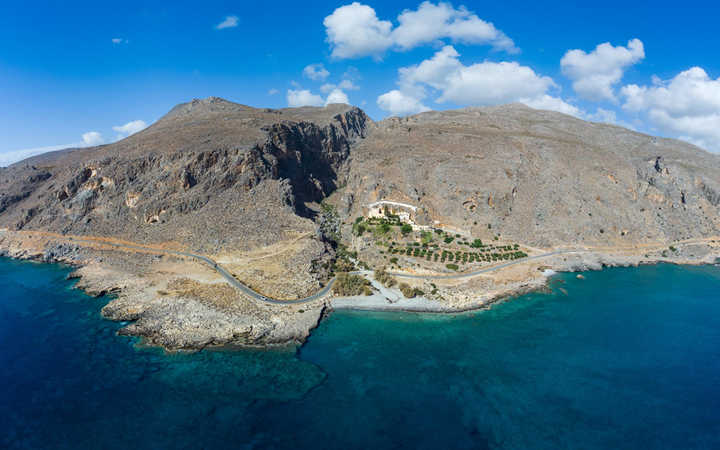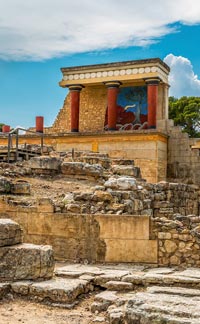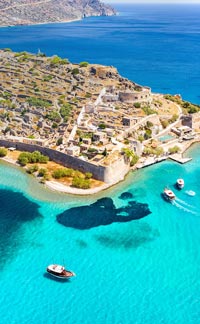Kapsa Monastery sits on an isolated stretch of Crete's southeast coast, 30 meters above the narrow ribbon of the coast road, on a level spot on the precipitous face of an upgrade, near the mouth of Perivolakia gorge. Its history dates back to at least the 15th century, with some believing it's 200 years older than that. You can imagine how isolated a place it was, on its barren hillside 700 years ago when there were no roads and the only access was by the boats which plied the waters of the Libyan Sea along Crete's south coast much less frequently than they did along Crete's much more populous, and Europe-facing, north coast. The monastery and its environs remind you a little of Mt. Athos in the Northern Aegean, that peninsula dedicated to the Virgin Mary with no women allowed on its territory. Provisions come by boat to Mt. Athos as well, and the 20 monasteries are connected by footpaths.
Kapsa was raided by Turks in 1471. They did a lot of damage. It stood in disrepair for the following nearly 400 years. Enter Ioannis Vitsentzos. He was also known as "Gerontoyiannis," "Old John." Most accounts say that he lived a rough life as a young man, and then, on Good Friday, 1841, he fell into a deep sleep and didn't wake for 43 hours. When he woke his family and friends were anxiously waiting at his bedside. That's when he told them that he had gone to heaven and seen wonderful things that he was unable to formulate in words.
The story goes that he dedicated himself to service of God, took the name of Joseph, left his family, and went to Kapsa, where he had been born 42 years before. In 1866, an old man now, he began to supervise the reconstruction of the monastery, a task that took 5 years. Four years after the work was finished, he died at the monastery in 1874 at the age of 75.
Another version of his story has him mending his ways after he and his wife left the home on an errand and in their absence losing one of their daughters to a house fire. Deciding this was a sign from God, Ioannis repented, and joined the monastery.
St. Joseph Gerontoyiannis has since been beatified by the Eastern Orthodox Church, partly for his exemplary later life, and for the miracles and healings that are attributed to him. His fame as a healer attracted people to Kapsa, and he began the renovation, perhaps, partly to house visitors. The Feast of St. Joseph Gerontoyiannis is August 7th on the Orthodox calendar. On that day hundreds of people visit the monastery, and the saint's relics (which are housed there).
Kapsa monastery welcomes appropriately-dressed visitors all year round.



















